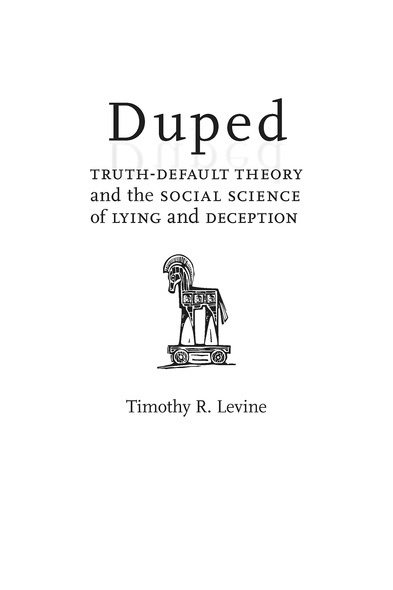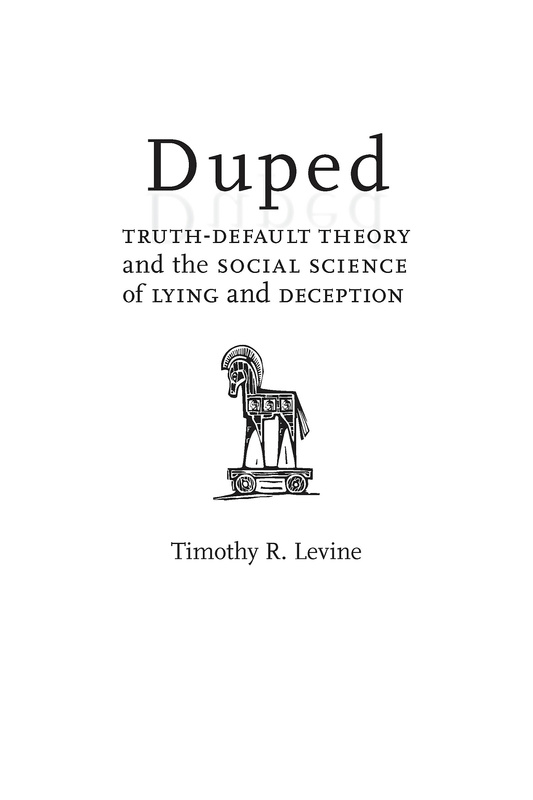
384 pages, 6 x 9
15 B&W figures - 18 tables
Paperback
Release Date:05 Nov 2019
ISBN:9780817359683
Hardcover
Release Date:05 Nov 2019
ISBN:9780817320416
Duped
Truth-Default Theory and the Social Science of Lying and Deception
University of Alabama Press
A scrupulous account that overturns many commonplace notions about how we can best detect lies and falsehoods
From the advent of fake news to climate-science denial and Bernie Madoff’s appeal to investors, people can be astonishingly gullible. Some people appear authentic and sincere even when the facts discredit them, and many people fall victim to conspiracy theories and economic scams that should be dismissed as obviously ludicrous. This happens because of a near-universal human tendency to operate within a mindset that can be characterized as a “truth-default.” We uncritically accept most of the messages we receive as “honest.” We all are perceptually blind to deception. We are hardwired to be duped. The question is, can anything be done to militate against our vulnerability to deception without further eroding the trust in people and social institutions that we so desperately need in civil society?
Timothy R. Levine’s Duped: Truth-Default Theory and the Social Science of Lying and Deception recounts a decades-long program of empirical research that culminates in a new theory of deception—truth-default theory. This theory holds that the content of incoming communication is typically and uncritically accepted as true, and most of the time, this is good. Truth-default allows humans to function socially. Further, because most deception is enacted by a few prolific liars, the so called “truth-bias” is not really a bias after all. Passive belief makes us right most of the time, but the catch is that it also makes us vulnerable to occasional deceit.
Levine’s research on lie detection and truth-bias has produced many provocative new findings over the years. He has uncovered what makes some people more believable than others and has discovered several ways to improve lie-detection accuracy. In Duped, Levine details where these ideas came from, how they were tested, and how the findings combine to produce a coherent new understanding of human deception and deception detection.
From the advent of fake news to climate-science denial and Bernie Madoff’s appeal to investors, people can be astonishingly gullible. Some people appear authentic and sincere even when the facts discredit them, and many people fall victim to conspiracy theories and economic scams that should be dismissed as obviously ludicrous. This happens because of a near-universal human tendency to operate within a mindset that can be characterized as a “truth-default.” We uncritically accept most of the messages we receive as “honest.” We all are perceptually blind to deception. We are hardwired to be duped. The question is, can anything be done to militate against our vulnerability to deception without further eroding the trust in people and social institutions that we so desperately need in civil society?
Timothy R. Levine’s Duped: Truth-Default Theory and the Social Science of Lying and Deception recounts a decades-long program of empirical research that culminates in a new theory of deception—truth-default theory. This theory holds that the content of incoming communication is typically and uncritically accepted as true, and most of the time, this is good. Truth-default allows humans to function socially. Further, because most deception is enacted by a few prolific liars, the so called “truth-bias” is not really a bias after all. Passive belief makes us right most of the time, but the catch is that it also makes us vulnerable to occasional deceit.
Levine’s research on lie detection and truth-bias has produced many provocative new findings over the years. He has uncovered what makes some people more believable than others and has discovered several ways to improve lie-detection accuracy. In Duped, Levine details where these ideas came from, how they were tested, and how the findings combine to produce a coherent new understanding of human deception and deception detection.
Levine’s research on lie detection and truth-bias has produced many new findings during his 25 years studying deception; he has more than 140 articles of published research appearing in academic journals. Levine has uncovered what makes some people more believable than others and has discovered several ways to improve lie-detection accuracy. In Duped, Levine details where these ideas came from, how they were tested, and how the findings combine to produce a coherent new understanding of human deception and deception detection.’
—UWIRE Text
‘Tim Levine has given us an elegant and persuasive explanation of one of the oldest puzzles in psychology. Why are human beings so easily deceived? Duped has completely changed my understanding of liars and their lies.’
—Malcolm Gladwell, author of Outliers: The Story of Success and host of the podcast Revisionist History
Timothy R. Levine is distinguished professor and chair of the department of communication studies at the University of Alabama–Birmingham. He has been studying deception for more than twenty-five years and has published his research in more than 140 articles in academic journals.
List of Illustrations
Preface
Acknowledgments
List of Studies and Experiments
Part I: The Social Science of Deception
Chapter 1. The Science of Deception
Chapter 2. Cues
Chapter 3. Deception Detection Accuracy
Chapter 4. Rivals
Chapter 5. Critiquing the Rivals
Part II: Truth-Default Theory
Chapter 6. Truth-Default Theory Summarized
Chapter 7. Defining Deception (Beyond BFLs and Conscious Intent)
Chapter 8. Information Manipulation (Beyond BFLs and Conscious Intent, Part 2)
Chapter 9. Prevalence
Chapter 10. Deception Motives
Chapter 11. Truth-Bias and Truth-Default
Chapter 12. The Veracity Effect and Truth–Lie Base-Rates
Chapter 13. Explaining Slightly-Better-than-Chance Accuracy
Chapter 14. Improving Accuracy
Chapter 15. The TDT Perspective
Notes
Bibliography
Index






